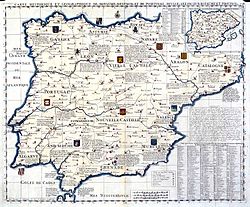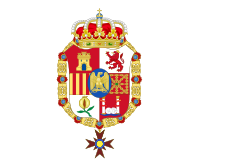
Back مملكة إسبانيا النابليونية Arabic Napoleonské Španělsko Czech España napoleónica Spanish Espainia (Napoleonen Okupazioa) Basque اسپانیا در زمان ژوزف بناپارت Persian Royaume d'Espagne (1808-1813) French ממלכת ספרד הנפוליאונית HE Kerajaan Spanyol (Napoleon) ID Spagna napoleonica Italian ジョゼフ・ボナパルト治世下のスペイン Japanese
This article needs additional citations for verification. (June 2023) |
Kingdom of (the) Spain(s)[a] and (the) Indies | |||||||||
|---|---|---|---|---|---|---|---|---|---|
| 1808–1813 | |||||||||
| Motto: Plus Ultra (Latin) "Further Beyond" | |||||||||
| Anthem: Marcha Real (Spanish) "Royal March" | |||||||||
 Spanish territory controlled at some point during the war by King Joseph Bonaparte. Military governments dependent on Paris (since 1810): Biscay, Navarre and Aragon Military government of Catalonia, dependent on Paris (since 1810) / Territory annexed to the French Empire (since 1812). Territory never controlled by Joseph Bonaparte's government, besides Spanish America: Canary Islands, Cadiz, Ceuta, Melilla, Cartagena, Alicante and Balearic Islands. | |||||||||
| Status | Client state of the French Empire | ||||||||
| Capital | Madrid | ||||||||
| Official languages | Spanish French (dynastic) | ||||||||
| Common languages | Catalan Basque Galician | ||||||||
| Religion | Catholicism (State Religion) | ||||||||
| Demonym(s) | Spaniard, Spanish | ||||||||
| Government | Unitary semi-constitutional monarchy | ||||||||
| King | |||||||||
• 1808–1813 | Joseph I | ||||||||
| Regent | |||||||||
• 1808 | Joachim Murat | ||||||||
| First Secretary of State | |||||||||
• 1808–1813 | Mariano Luis de Urquijo | ||||||||
• 1813 | Juan O'Donoju O'Ryan | ||||||||
• 1813 | Fernando de Laserna | ||||||||
| Legislature | Cortes Generales | ||||||||
| Historical era | Napoleonic Wars | ||||||||
| 6 May 1808 | |||||||||
| 8 July 1808 | |||||||||
| 21 June 1813 | |||||||||
| 11 December 1813 | |||||||||
| Currency | Spanish real | ||||||||
| |||||||||
| Today part of | Spain | ||||||||
| History of Spain |
|---|
 18th century map of Iberia |
| Timeline |
Bonapartist Spain was a Napoleonic client state established in 1808 after Napoleon, who had stationed his Imperial Army in Spain under the pretense of a joint Franco–Spanish invasion of Portugal, forced the ruling Spanish Bourbons to abdicate, and installed his brother, Joseph Bonaparte on the Spanish throne.
The kingdom was officially known as Kingdom of (the) Spain(s)[a] and (the) Indies, with "the Indies" referring to the East and West Indies as well as Spain's colonial possessions more broadly. It never managed to exert control over all of these territories however, not only did the French invasion weaken Spain's grasp on its overseas empire, kickstarting the Spanish American wars of independence, but even on the Spanish mainland, the House of Bonaparte's grip was tenuous. Large parts of the country came under the control of juntas, which remained loyal to Ferdinand VII and the old Bourbon kingdom, allying with the Coalition forces of Britain and Portugal to undermine the French occupation, in what came to be known as the Peninsular War.
Fighting across the Iberian Peninsula would be largely inconclusive until a series of Coalition victories from 1812 to 1813 at Salamanca and Vitoria meant the defeat of the Bonapartist régime and the expulsion of Napoleon I's troops. The Treaty of Valençay recognized Ferdinand VII as the legitimate King of Spain,[1] though the Bourbon and Anglo-Portuguese forces continued to pursue the retreating French Imperial Army as part of the Sixth Coalition.
Cite error: There are <ref group=lower-alpha> tags or {{efn}} templates on this page, but the references will not show without a {{reflist|group=lower-alpha}} template or {{notelist}} template (see the help page).
- ^ José Luis Comellas (1988). Historia de España Contemporánea. Ediciones Rialp. ISBN 978-84-321-2441-9. Retrieved 3 August 2012.
© MMXXIII Rich X Search. We shall prevail. All rights reserved. Rich X Search

